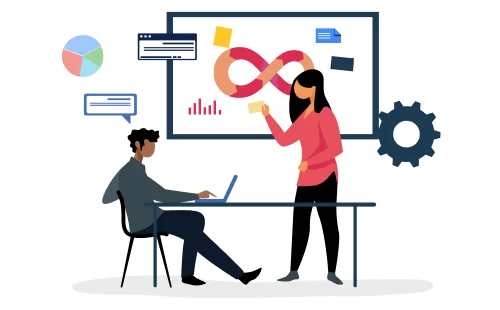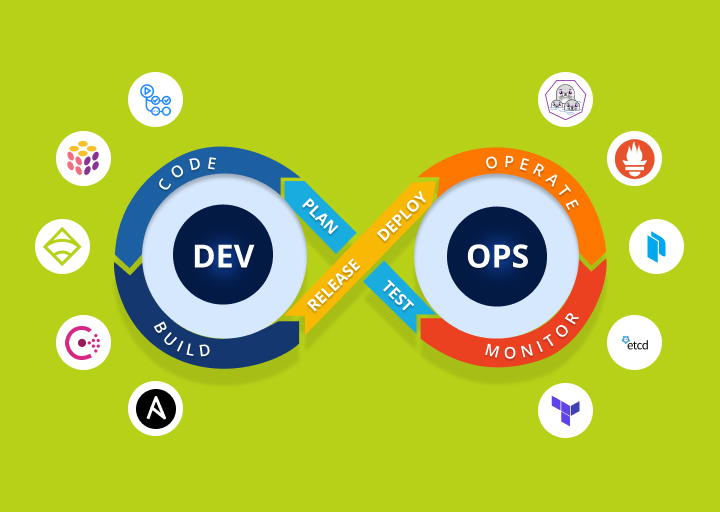DevOps Consulting Services

Transform Your IT Operations with DevOps.
DevOps is a methodology aimed at unifying development and operations teams to quickly deliver high-quality software. Since 2014, Etelligens has provided comprehensive DevOps consulting services to help businesses achieve an elevated frequency and reliability of software releases. By integrating continuous automation, modern toolchains, and close team collaboration, we support robust, scalable workflows that adapt as your application ecosystem grows.
Is It Time to Turn to DevOps Consulting?
DevOps consulting may be the answer if you’re experiencing:
- Differences in environment configurations: Challenges arise when development, testing, and production setups aren’t aligned, leading to unexpected deployment failures.
- Slow manual infrastructure provisioning: Waiting on lengthy setup processes can delay product releases and hamper innovation.
- Cumbersome software updates and bug fixes: Without automated pipelines, applying changes can be slow, error-prone, and costly.
- Lack of cross-team collaboration: Siloed development, testing, system administration, and security teams may yield lower software quality and extended release cycles.
- Post-release errors: Errors that surface after deployment can diminish user trust and impact revenue.
- Inefficient testing processes: Inadequate test automation often leads to missed defects, causing critical rework and delays.
DevOps Services by Etelligens
End-to-End DevOps Implementation Consulting
We help you apply connected, automated DevOps consulting services across all stages of application development:
- Infrastructure as Code (IaaC) We configure and maintain your infrastructure with code-driven, repeatable scripts for reliability and scalability.
- Containerization of App Modules By using tools like Docker or Kubernetes, we streamline deployment and resource efficiency.
- CI/CD Setup We establish continuous integration and continuous deployment pipelines (e.g., Jenkins, GoCD, Bamboo) for faster, more frequent releases.
- Test Automation Our approach integrates popular frameworks like Selenium or Appium to reduce manual testing overhead and accelerate feedback loops.
- Automated Monitoring Comprehensive monitoring solutions (e.g., Nagios, Zabbix) help proactively detect issues before they affect end users.
DevOps Project Recovery Consulting
Our experts step in to:
- Resolve collaboration issues among dev, QA, and operations teams.
- Address DevOps skill gaps by providing personalized training in tools and methodologies.
- Fix technical hiccups like CI/CD configuration errors, containerization problems, or misaligned infrastructure.
- Optimize test coverage ensuring better detection of issues earlier in the development process.
DevOps Launch Consulting
- Strategic Planning We create a roadmap and define measurable objectives for DevOps adoption.
- Detailed Implementation Path Our team outlines tools, processes, and best practices for each phase of your DevOps journey.
- Workforce Upskilling We train your developers, testers, and sysadmins in DevOps concepts and tech tools.
- DevOps Setup Assistance We work hands-on to ensure a smooth, well-structured transition into DevOps environments.
DevOps Tech Consulting
- Tool Selection & Configuration We pinpoint the right DevOps stacks, like Docker, Kubernetes, Ansible, or Chef, to match your unique environment.
- Team Enablement Our experts guide your internal staff on effectively using new DevOps technologies.
Managed DevOps Services and DevOps Outsourcing
If you prefer a hands-off approach, we can fully manage your DevOps transformation:
- IaaC, CI/CD, Containerization, and Orchestration Whether you’re on Docker, Kubernetes, or other orchestration platforms, we ensure stability and efficiency.
- Test Automation We build robust frameworks that prevent release slowdowns and maintain high-quality standards.
- Cloud Infrastructure Management Including firewalls, vulnerability scanning, and permission management to protect your DevOps pipeline.
- Continuous Security Including firewalls, vulnerability scanning, and permission management to protect your DevOps pipeline.
- Logging and Performance Monitoring Real-time alerts and analysis provide immediate insight into system health.
- Incident Management & Disaster Recovery Our approach minimizes downtime with reliable backup and recovery protocols.
Sample End-To-End DevOps Implementation Scenario
Plan
What we do:
- Analyze your current software development cycle, existing IT resources, and infrastructure.
- Pinpoint business expectations, evaluate capabilities, and spot constraints.
- Formulate a comprehensive DevOps strategy.
Create Roadmap
What we do:
- Design the containerization approach (e.g., Kubernetes or Apache Mesos).
- Define and configure CI/CD tools like Jenkins or GoCD.
- Recommend automation solutions (often Selenium and Appium) to integrate continuous testing.
- Incorporate IaaC and config management tools (Ansible, Chef, Puppet) with your CI/CD pipeline.
- Propose automated monitoring solutions (Zabbix, Nagios).
- Identify potential DevOps challenges (e.g., knowledge gaps, containerizing legacy apps).
Execute
What we do:
- Upskill your IT stakeholders, including system admins, PMs, developers and QA engineers, in relevant DevOps tools.
- Implement the IaaC approach for frictionless environment setup.
- Assist in deploying and configuring CI/CD pipelines and testing frameworks.
Support
What we do:
- Offer ongoing mentoring to keep DevOps objectives on track.
- Handle changes to your infrastructure and balance load distribution.
- Provide a stable environment for continuous release cycles.
DevOps-Specific Challenges You Can Face and We Can Solve
Challenge 1:
Resistance to DevOps Adoption
Solution: Etelligens’s DevOps consultants run personalized training and change management sessions that encourage collaboration between development, QA, and operations, ensuring smoother cultural integration.
Challenge 2:
Uncertainty about Technology Choices
Solution: Based on your DevOps plan, our experts guide you on selecting the right combination of containerization, CI/CD, and automation tools (e.g., Docker, Kubernetes, Jenkins, Chef) that aligns with your team’s proficiency and future objectives.
Challenge 3:
Adapting Legacy Applications to DevOps
Solution: We suggest modernization strategies like rehosting, reengineering, or recoding, so even older apps can benefit from containerization, continuous integration, and other DevOps best practices.
Leveraging DevOps for Strategic Growth
DevOps isn’t just about faster releases. When done right, it aligns IT initiatives with broader business goals:

Data-Driven Decision Making
By integrating analytics tools into your DevOps pipeline, you can track performance metrics in real time. This information helps refine release processes, reduce rework, and achieve consistent improvements.

Security and Compliance
Automated security scans and compliance checks woven into CI/CD pipelines prevent bottlenecks and reduce risk. Continuous monitoring ensures quicker detection of vulnerabilities, mitigating threats before they escalate.

Scalability and Cost Optimization
With container orchestration in cloud environments, you can dynamically allocate resources and control operational costs. This elasticity ensures you only pay for what you use, supporting both high-traffic peaks and lean periods.

Enhanced Collaboration Culture
By breaking down silos and standardizing workflows, DevOps fosters a culture of shared responsibility. Team members from different departments gain visibility into each other’s workflows, which helps speed time-to-market and drive innovative outcomes.
Through these strategies, DevOps transcends tactical benefits, directly impacting overall efficiency, profitability, and customer satisfaction.
Frequently Asked Questions
1. What does a DevOps consultant do?
A DevOps consultant plays a crucial role in evaluating existing infrastructure and processes, pinpointing areas that need enhancement, and devising a comprehensive plan to address these improvements. They ensure the implementation of this plan to streamline operations and boost overall efficiency.
2. What services are offered by DevOps?
DevOps services break down barriers between different teams, enabling them to collaborate on a unified platform. This approach leads to numerous benefits, including a growing user base, higher customer satisfaction, enhanced system stability, and an accelerated development process. Additionally, it reduces complexity and allows for faster issue resolution, significantly improving overall operational efficiency.
3. Which tool is mostly used in DevOps?
Puppet is a highly popular DevOps tool that streamlines the delivery and release of technology changes, making the process both quick and frequent. Its key features include versioning, automated testing, and continuous delivery. Puppet allows you to manage your entire infrastructure as code efficiently, without the need to expand your team size.
4. Does DevOps require coding?
Absolutely. Coding is a fundamental skill for anyone working in DevOps. Without it, you won't be able to effectively manage or automate tasks using code repositories.
5. Will AI replace DevOps?
AI is unlikely to completely replace DevOps professionals. Instead, it will serve as a powerful collaboration tool, enhancing human capabilities and enabling them to achieve more. AI tools still need human oversight and configuration to function effectively.
